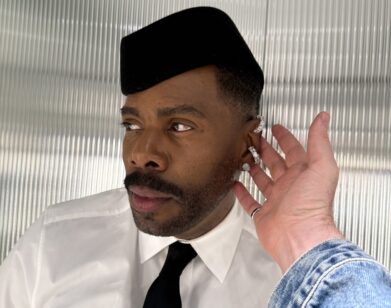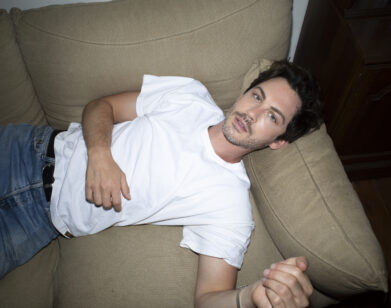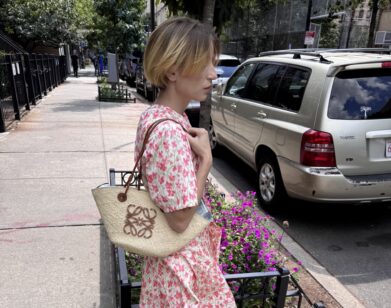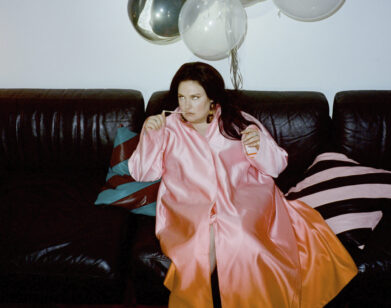Melancholia and the Inimitable, Skyping Kirsten Dunst
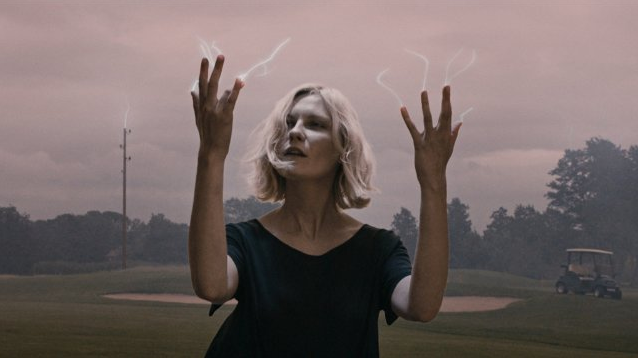
KIRSTEN DUNST IN MELANCHOLIA. IMAGE COURTESY OF MAGNOLIA PICTURES
At this point, it’s likely you’ve heard of Melancholia, though maybe for the wrong reasons. During a press conference during its premiere at the Cannes Film Festival in May, director Lars Von Trier stumbled through an ill-planned joke about Hitler that resulted in loads of terrible press and being deemed “persona non grata” by the festival. The whole ordeal has hung over the film like a dark cloud ever since.
What nobody is mentioning is that Melancholia is perhaps Von Trier’s greatest film, and features a once-in-a-lifetime performance by Kirsten Dunst as Justine, the bride-to-be whose slow descent during her lavish wedding reception mirrors a looming disaster in the form of a mysterious planet crashing into Earth. Dunst spoke to Interview about working with Von Trier, her love for Charlotte Rampling, and the aforementioned press conference.
CRAIG HUBERT: Congratulations on the award at Cannes.
KIRSTEN DUNST: Thank you.
HUBERT: How did you get attached to Melancholia? Did you just randomly get an e-mail from Lars one day?
DUNST: I was recommended to him by two directors. Then I got the script and they said he was very interested in me and that we were going to talk the next day. We Skyped, and it was a really easygoing, nice meeting. We didn’t even talk about the script that much, and then our Skype connection got lost, and we called each other on the phone. It was really like the most simple—for the director that he is, it was like the easiest job that I got in so long, it was so simple, it was just like, “Yes, I’d love you to be in my movie.” “Great, I’d love to be in it.”
HUBERT: I think the idea of Lars using Skype is funny.
DUNST: He Skypes. Well, he has kids and things too, you know. But yeah, it was definitely at his production office with people helping.
HUBERT: What was your experience working with Lars? He has a reputation for chaotic working environments.
DUNST: I think it probably had to do with where he was in his life. For us, I knew he was in a good place, so there wasn’t—yeah, he was really wonderful to work with.
HUBERT: Lars assembled a great ensemble cast in the film. What was it like to work with veteran actors like Charlotte Rampling and John Hurt?
DUNST: Charlotte Rampling has always been one of my favorites. Lars and I talked about her on our phone call, actually, because I knew she was in the film and I was just talking about how much I love her and that she’s one of my favorite actresses. I would not do films like this if I were not an admirer, and had been introduced and had women like her to look up to in this business. And John Hurt is one of the most straightforward, poetic, lovely people. Stellan, I love him too—crush on Stellan. He’s amazing. It couldn’t have been a lovelier group of people. Actors and people-wise, it was very easy to get to know and bond with everyone.
HUBERT: It’s interesting you mentioned Charlotte Rampling as an inspiration, because there’s something in your performance in Melancholia that reminds me of her work in The Night Porter.
DUNST: Really? Whoa, that is the biggest compliment I’ve gotten in, like, my life. [laughs] That’s huge!
HUBERT: The hard façade that slowly cracks is something Rampling does really well, the intensity. She’s sort of the perfect Lars Von Trier character. I’m surprised this is the first time he has used her.
DUNST: I’m surprised too. Charlotte’s not afraid of doing a lot of things. You know, I sometimes wish I had a more boyish—not a boy, but very thin, you know, not distracting. You know what I mean? I feel like I could never walk around a film half-naked. I definitely wouldn’t want to see that.
HUBERT: What spoke to you about the character of Justine?
DUNST: Well, I have to say the best scripts I read are usually pretty—they move really quickly, there’s not a lot of exposition in between all of what’s happening, so you can really just flow with the lines, and you’re reading and it has a momentum and you understand it emotionally. Or you’re questioning it, but it still feels like you experienced something, rather than just like, “Read a script.” This film had that and it’s the kind of script you read over and over again and it unravels more and more and becomes—you find more and more things to do as an actor. There’s so much it’s almost overwhelming. It took a really long time to work through, the most I’ve ever worked on a script.
HUBERT: When you say work on the script, what does that entail?
DUNST: It’s very personal to me, but it’s about, mostly, creating an inner life so that you feel like that person before you even step on screen. You’ve done the work emotionally. It’s kind of—yeah, it’s so personal, it’s kind of hard to be like, “I do this, I do that.” I think some of it sounds weird if I said it.
HUBERT: Do you do research?
DUNST: I use what Lars gives me. I definitely looked up a lot of his references or art that I didn’t know what it looked like and things like that. So I had that kind facade. The whole imagery of Ophelia, the crazy bride, the Wagner—the Wagner really gave me some more clues than I would ever express to Lars, because he’s someone who doesn’t like talking about it. He’s like, “That’s the music in the movie because that’s the music I like.” But obviously he picks it for a reason. A lot of art things, when I was confused about them, they definitely helped me.
HUBERT: Lars has spoken openly about his depression in the past, and has used it as material in previous films. Did you ever have discussions with him about the personal nature of the project?
DUNST: Yeah, I did—the first time meeting him, actually, and it was really intense. It wasn’t something that I expected. He was so open with me and honest right away.
HUBERT: You and Charlotte Gainsbourg play sisters in the film. What was the experience like working with her?
DUNST: I’ve always really liked her. There’s just an ease and a naturalness that you don’t get from most people. Also, she’s a very brave actress and naturally elegant. There’s just something about her that I think is special and unique. It was very easy for me, as an actress, to fall in love with her as a sister.
HUBERT: I know you’ve talked about your interest in music in the past. Did you two ever talk about music?
DUNST: I like her music. It’s so funny; I would catch myself humming her songs unconsciously when she was sitting next to me. I was like, “Sorry, Charlotte. I was just humming your song.” I like that album she did with Beck a lot. But I didn’t talk to her about music or anything. I’m surprised she does that, with how shy she is.
HUBERT: Well, it’s in her family.
DUNST: Yeah, but still. She’s pretty shy.
HUBERT: The comedy in the film was really surprising. There were a few big laughs. Was that in the script, or does Lars inspire that on set?
DUNST: It was in the script. I knew that the circumstances would be funny. We all played it very straight though, obviously. Someone asked me, “I was in the theater laughing. Was I supposed to laugh?”
HUBERT: It’s hard not to, with Udo Kier playing a wedding planner.
DUNST: Yeah. Udo. He’s so funny.
HUBERT: I’m sure you’re sick of talking about what happened at Cannes, but how did the press conference effect you? Were you worried about the comments made by Lars?
DUNST: I didn’t know what the repercussions would be, but I knew that it was bad. But I didn’t know what was going to happen. Lars is someone who says stuff like this a lot in the press, and he’s always been provocative with his words.
HUBERT: They certainly pushed him during the press conferences at Cannes.
DUNST: Yeah, and they asked him a sort of inappropriate question that spurred the whole conversation.
HUBERT: Did you have a discussion about it after?
DUNST: He apologized, because it affected us as a group, and we couldn’t celebrate together. I know he was embarrassed.
HUBERT: I’m sure you’ll be glad to get past the press for this film and not having to talk about Lars.
DUNST: No, I don’t mind talking about Lars at all.
HUBERT: Would you work with him again?
DUNST: Of course.
MELANCHOLIA IS OUT IN LIMITED RELEASE NOVEMBER 11.

